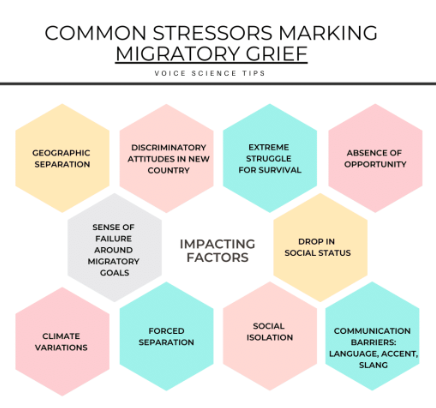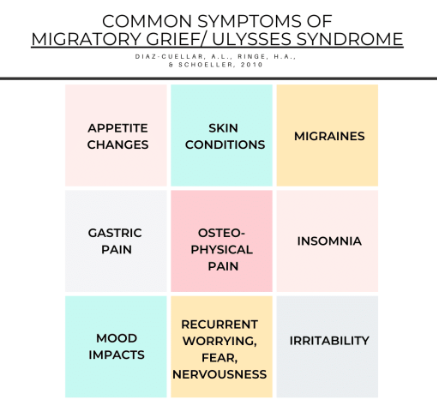migration therapy
“Traveling is an exercise with fatal consequences for prejudice, bigotry and narrow-mindedness”
Mark Twain
In today’s world, the traveler’s dream has been romanticized. Everyone wants to explore the world, “get lost to find yourself,” discover places and cultures to discover your own, find better life opportunities, or simply to have more stamps in your passport.
However, there are some who get lost in the dream, and they find themselves in a foreign homeland, immersed in instability and enveloped in uncertainty.
They are the ones who migrate.
Migrants become constant discoverers in perpetual nostalgia, yet somehow remain steadfast, understanding that where they are is where they have better opportunities.
Some say that migrating is almost as difficult as grieving for a loved one. As a Psychologist, Therapist and a Migrant myself, I agree.

Migration Grief



The Ulysses Syndrome, also known as Migration Grief comes from the story of Ulysses.
Ulysses was a ancient Greek hero known for many mythical stories and harrowing adventures. He spent ten years living in distant lands and another ten fighting to return to his homeland.
Ulysses “spent his days sitting on the rocks by the sea, being consumed by tears, sighs and sadness…” Odyssey, Song V.
The Ulysses Syndrome is an atypical set of depressive, anxious, dissociative, and somatoform symptoms that results from being exposed to extreme levels of stress due to the process of migration.
While migrant life is not all doom and gloom, it has its challenges.
Migrants often face multiple forms of uniquely intense stressors, such as the death of loved ones, lack of jobs and social support, difficulties in the migratory process, and loss of status and identity.
The Ulysses syndrome encompasses a range of physical and psychological symtoms:
- Migraines,
- Sleep disturbances,
- Persistent anxiety,
- Stress,
- Irritability,
- Confusion,
- Apprehension,
- Fatigue,
- Melancholy,
- Abdominal discomfort or Irritable Bowel Symdrome,
- Skeletal pain,
- Diminished self-esteem,
- Escalated use of tobacco and alcohol,
- Reduced productivity
The syndrome is characterized by a range of psychological and physical symptoms, including:
Trauma and Stress.
Depression and Anxiety: Immigrants with Ulises syndrome often experience symptoms of depression, anxiety, and post-traumatic stress disorder (PTSD) as a result of the challenges they have faced.
Physical Symptoms: The stress and trauma associated with migration can manifest in physical symptoms such as headaches, gastrointestinal issues, fatigue, and sleep disturbances.
Cultural and Social Isolation: Immigrants with Migration Grief/Ulises Syndrome may struggle to integrate into their new environment, leading to feelings of isolation, loneliness, and a sense of not belonging.
Loss of Identity: The experience of migration and adapting to a new culture can sometimes lead to a loss of cultural identity and a sense of disconnection from one’s roots.
Psychotherapy for Migrants
Psychotherapy for migrants focuses on addressing the unique psychological, emotional, and cultural challenges that individuals and families may encounter during the process of migration and resettlement. This type of therapy is designed to provide support, guidance, and coping strategies to help migrants navigate the complexities of adapting to a new culture, dealing with stressors related to migration, and maintaining mental well-being. Psychotherapy for migrants may involve various approaches and techniques tailored to their specific needs.
This specific and particular type of therapy helps migrants develop effective coping strategies to manage stress, isolation, and cultural adjustment in a safe space to explore questions of identity and navigate the changes that migration can bring to their sense of self.
Therapy can provide guidance on acculturation, helping migrants balance their cultural heritage with the demands of their new environment, focusing on foster resilience and enhancing emotional well-being to better navigate the challenges of migration.
Cognitive-Behavioral Therapy (CBT) CBT can be effective in addressing anxiety, depression, and adjusting maladaptive thought patterns related to migration stressors.


BOOK APPOINTMENT & INFO
Together we will find the way to help you
- Call us: 0451344805
- +61451344805
- psy.constanza@gmail.com
- ps_constanza
- 410/251 Oxford Street, Bondi Junction, 2022

